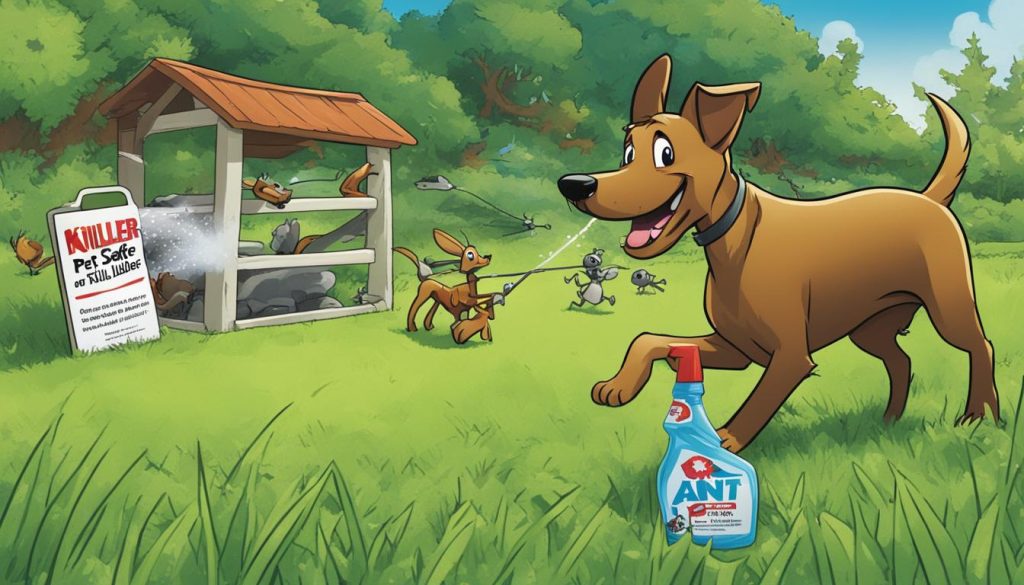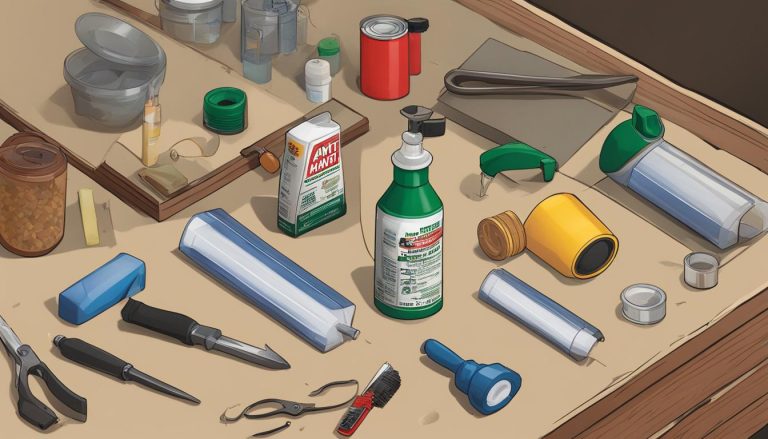When we’re battling those pesky ants in our homes, we often forget to ask – can ant killer hurt dogs? As Aussie pet owners, it’s a bunyip-sized concern. Truth is, the ant killer toxicity for dogs is no piece of fairy bread; it’s something we’ve got to yarn about. Just like us, our furry mates can get crook if they snaffle something they shouldn’t. So, let’s get down to brass tacks:
Imagine a classic arvo – you’ve got snags on the barbie, and you’re getting ready for a ripper of a backyard footy game. But then you spot ants. You might dash for the ant killer without thinking twice. But hang on a mo’! If your four-legged friend is darting around, you need to be wary of the dangers of ant killer to dogs.
Those little black traps? They look boring to you and me, but they might as well be a wad of Hubba Bubba to your pooch. Let’s have a squiz at how you can protect your doggo from the potential nasties hidden in those ant traps.
Key Takeaways
- Ant traps can be risky for dogs, especially because they taste like the bush tucker dogs love.
- Ant killer toxicity for dogs can result in the poor blokes getting diarrhoea or worse.
- Keep your furry mate safe by placing traps where they can’t get to them.
- Always have the Pet Poison Helpline in your back pocket – just in case.
- Act like a kangaroo in a hurry if you think your dog has eaten ant killer – get them to the vet quick smart!
The Potential Risks of Ant Killers on Canine Health
The safety of our four-legged friends is a critical consideration when using products to combat ant infestations. Ant killers, though effective at eliminating these pests, can pose significant health risks to dogs if not used cautiously. Understanding these risks, the associated symptoms, and the appropriate emergency response is fundamental for keeping dogs safe from ant killer.
Poisonous Ingredients in Common Ant Killers
Many commonly used ant killers may be packed with chemicals that are harmful to dogs. Even products like Advion Ant Gel and Terro Liquid Ant Bait, which are low in toxicity to humans, can have serious consequences for canine health if ingested in large quantities or used improperly. It’s important to always opt for pet-friendly ant killer alternatives and to apply them according to the instructions to mitigate potential dangers.
Recognising Symptoms of Ant Killer Poisoning in Dogs
Knowing the warning signs of ant killer poisoning in dogs can be life-saving. Symptoms to look out for include:
- Excessive salivation
- Vomiting
- Coughing
- Lethargy
- Diarrhea
If a dog shows any of these symptoms after being exposed to ant killer, it’s crucial to act swiftly, as these hint towards toxic ingestion.
Immediate Actions to Take if Your Dog Has Been Exposed
If you suspect that your dog has ingested ant poison, take the following steps without delay:
- Remove any remaining ant killer from your dog’s reach.
- Check your dog’s mouth for remnants of the substance and for injuries.
- Call the Pet Poison Helpline for immediate advice.
- Transport your dog to an emergency veterinary clinic if symptoms are severe.
Following these steps and getting professional advice will ensure the best possible outcome for your pet’s health.
An understanding of what to do if your dog ingests ant poison is not merely advantageous; it’s a necessity for every pet owner. The need for an emergency response to ant killer in dogs is a real concern, which is why it’s integral to always have access to the Pet Poison Helpline and to keep contact details for your local vet on hand. A prompt and informed reaction can prevent the harmful effects of ant killer on dogs, safeguarding their wellbeing.
| Ant Killer Substance | Potential Effect on Dogs | Safe Use Instructions |
|---|---|---|
| Advion Ant Gel | Can cause mild to moderate digestive upset | Apply in areas inaccessible to dogs |
| Terro Liquid Ant Bait | Possibility of toxicity if ingested in large amounts | Ensure baits are placed out of reach |
| Pet-friendly Ant Killers | Generally safer, but still use with caution | Follow label directions carefully |
Keeping dogs safe from ant killer is not an insurmountable task. By choosing the right products, being mindful of how they are applied around the home, and being prepared for an emergency, you can ensure that both your home is ant-free and your pets are healthy and happy.

Can Ant Killer Hurt Dogs: Understanding Pet Safety and Exposure
As a dog owner, it’s crucial to find a safe ant killer for dogs to ensure your furry friend’s safety. While keeping your home ant-free, it’s equally important to choose products that prioritize pet-safe ant prevention. There’s good news for dog parents, as several ant control solutions can effectively fend off ants without harming dogs.
Diatomaceous earth, a powdery substance made from the fossilized remains of tiny aquatic organisms, is one FDA-recognized option that is non-toxic to pets when used correctly. Additionally, there are various borate-based baits and essential oils that can serve as pet-friendly alternatives to traditional ant killers.
Let’s take a closer look at some measures you can adopt to safeguard your pets:
- Choose ant killers that are specifically labelled as safe for use around pets.
- Always follow the application instructions carefully to avoid undue risk.
- Place ant baits in inaccessible areas for pets, such as behind appliances or inside closed cabinets.
- Prevent your dogs from entering treated areas until any applied ant killer is completely dry.

To aid in your decision-making, here’s a simple table comparing common pet-safe ant prevention products:
| Product | Active Ingredient | Usage Note | Consideration for Dogs |
|---|---|---|---|
| Diatomaceous Earth | Silica | Apply thinly on areas where ants are seen | Ensure it is food-grade and not pool-grade |
| Borate-Based Baits | Borate Compounds | Use enclosed bait stations | Keep out of reach to prevent ingestion |
| Essential Oil Sprays | Peppermint, Citrus, or Tea Tree Oil | Spray directly onto ant trails | May require more frequent application |
Remember, the best ant killer without harming dogs is one that’s used with careful attention to safety and pet accessibility. By taking these simple steps, you can keep both your canine companion and your home free from unwanted ants.
Conclusion
Ensuring our furry friends are safe from household dangers is a top priority for all pet owners. When it comes to keeping both ants and dogs away from harm, opting for dog-safe ant killers and employing proactive measures are essential. Below you’ll find the key takeaways for managing ant control in a pet-loving home.
Choosing Dog-Safe Ant Killer Options
It’s paramount to pick non-toxic ant control solutions that won’t harm our dogs. Search for pet-friendly ant solutions like borate-based baits and pure, food-grade diatomaceous earth. These products are designed to tackle the ant problem without posing a risk to your pet’s health. Always follow the instructions on the label and use these products responsibly for the best outcome.
Proactive Steps for Ant Control Without Harming Dogs
Prevention is better than cure, so here are a few ant control tips for dog owners:
- Keep your home clean from food bits and spills that attract ants.
- Improve airflow and keep plants and mulch away from the house to remove ant habitats.
- Place ant baits in spots your dog can’t reach, like behind appliances or inside locked cupboards.
By following these easy steps, you’re not only preventing ant infestations safely but also keeping your precious pooch out of harm’s way.
The Importance of Monitoring and Quick Response
Lastly, should your dog accidentally ingest ant killer, it’s crucial to react swiftly. Responding to dog ant killer ingestion without delay and being aware of the importance of quick treatment for ant poison in dogs can make a huge difference. Watch for any unusual signs in your dog’s behaviour and speak to a vet immediately if you suspect something’s not right. Your promptness can lead to a speedy recovery and a happy, healthy dog.
FAQ
Can ant killer hurt dogs?
Yes, ant killers can potentially hurt dogs. The insecticide within ant traps could pose a risk to canine health if consumed, leading to symptoms like diarrhea, vomiting, and bloody stools which may require immediate veterinary attention.
What are the dangers of ant killer to dogs?
The dangers of ant killer to dogs come from the toxic substances contained in them. Consumption of these insecticides can lead to poisoning, with symptoms that may include excessive salivation, vomiting, or coughing.
What poisonous ingredients should I look out for in common ant killers?
Many ant killers contain substances like borax, abamectin, or pyrethroids, which can be harmful to dogs if ingested. Peanut butter used in ant traps can also attract dogs, increasing the risk of accidental consumption.
How can I recognise symptoms of ant killer poisoning in dogs?
Symptoms of ant killer poisoning in dogs include excessive drooling, vomiting, lethargy, coughing, pale gums, and a rapid heart rate. If you notice any of these signs after your dog has been around ant killer, contact your veterinarian immediately.
What immediate actions should I take if my dog has been exposed to ant killer?
If you suspect your dog has been exposed to ant killer, remove any remaining killer from their mouth, observe for signs of distress, and seek immediate veterinary care. Contact the Pet Poison Helpline for guidance and follow your vet’s instructions closely.
Are there any safe ant killer options for dogs?
Yes, there are pet-safe options such as borate-based baits and diatomaceous earth, which are lower in toxicity and considered safer for pets when used as directed. However, always ensure that these products are kept out of reach of your pets.
How can I prevent ant infestations safely in a household with dogs?
Preventing ant infestations while ensuring canine safety involves regular house cleaning to remove food debris, arranging for proper airflow, and placing vegetation strategically to prevent ants from entering. Use pet-friendly ant baits and apply them in areas inaccessible to dogs. Regularly monitor for ant trails.
What non-toxic ant control methods are advisable around dogs?
Non-toxic ant control methods advisable around dogs include food-grade diatomaceous earth, essential oils, and borate-based baits. These should be used as per instructions and properly applied to minimize exposure risk to pets.
What is the importance of quick treatment for ant poison in dogs?
Quick treatment for ant poison in dogs is critical for mitigating health risks and improving the chances of a full recovery. Delay in treatment could result in severe complications or even be fatal. Always act immediately if you suspect your dog has ingested ant poison.






